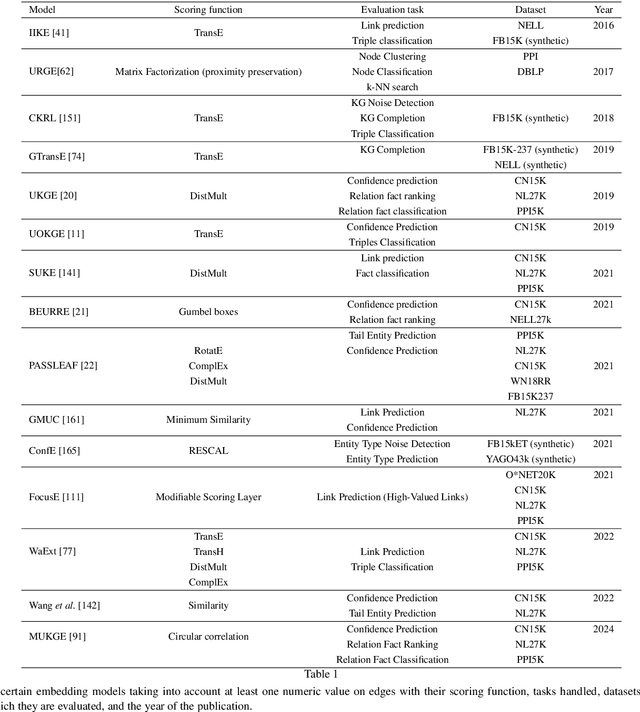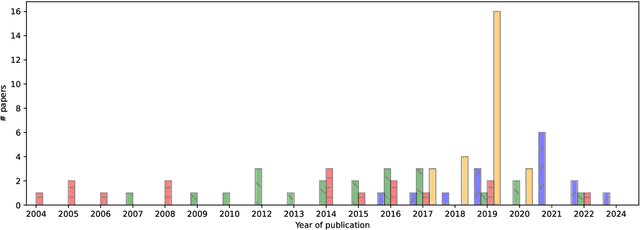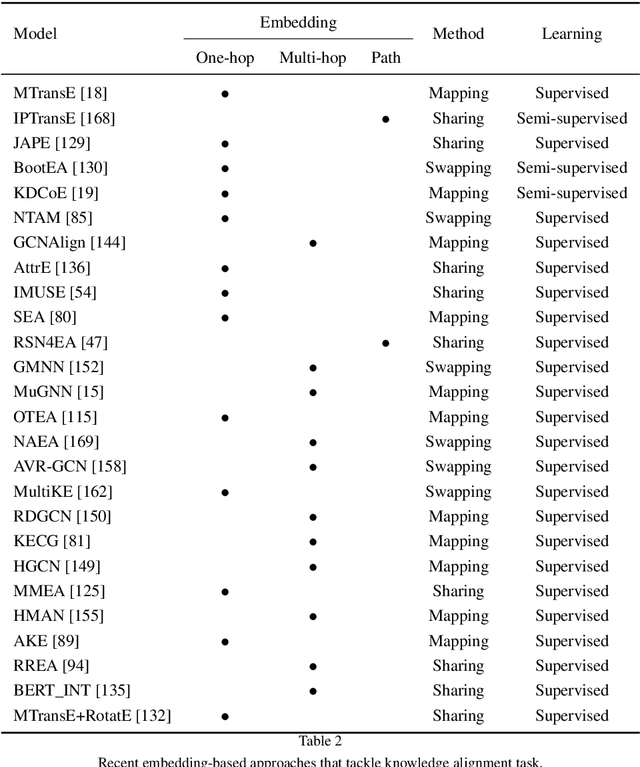Miguel Couceiro
LORIA
Generalizing Analogical Inference from Boolean to Continuous Domains
Nov 13, 2025Abstract:Analogical reasoning is a powerful inductive mechanism, widely used in human cognition and increasingly applied in artificial intelligence. Formal frameworks for analogical inference have been developed for Boolean domains, where inference is provably sound for affine functions and approximately correct for functions close to affine. These results have informed the design of analogy-based classifiers. However, they do not extend to regression tasks or continuous domains. In this paper, we revisit analogical inference from a foundational perspective. We first present a counterexample showing that existing generalization bounds fail even in the Boolean setting. We then introduce a unified framework for analogical reasoning in real-valued domains based on parameterized analogies defined via generalized means. This model subsumes both Boolean classification and regression, and supports analogical inference over continuous functions. We characterize the class of analogy-preserving functions in this setting and derive both worst-case and average-case error bounds under smoothness assumptions. Our results offer a general theory of analogical inference across discrete and continuous domains.
Comparing representations of long clinical texts for the task of patient note-identification
Mar 31, 2025



Abstract:In this paper, we address the challenge of patient-note identification, which involves accurately matching an anonymized clinical note to its corresponding patient, represented by a set of related notes. This task has broad applications, including duplicate records detection and patient similarity analysis, which require robust patient-level representations. We explore various embedding methods, including Hierarchical Attention Networks (HAN), three-level Hierarchical Transformer Networks (HTN), LongFormer, and advanced BERT-based models, focusing on their ability to process mediumto-long clinical texts effectively. Additionally, we evaluate different pooling strategies (mean, max, and mean_max) for aggregating wordlevel embeddings into patient-level representations and we examine the impact of sliding windows on model performance. Our results indicate that BERT-based embeddings outperform traditional and hierarchical models, particularly in processing lengthy clinical notes and capturing nuanced patient representations. Among the pooling strategies, mean_max pooling consistently yields the best results, highlighting its ability to capture critical features from clinical notes. Furthermore, the reproduction of our results on both MIMIC dataset and Necker hospital data warehouse illustrates the generalizability of these approaches to real-world applications, emphasizing the importance of both embedding methods and aggregation strategies in optimizing patient-note identification and enhancing patient-level modeling.
Unveiling Biases while Embracing Sustainability: Assessing the Dual Challenges of Automatic Speech Recognition Systems
Mar 02, 2025Abstract:In this paper, we present a bias and sustainability focused investigation of Automatic Speech Recognition (ASR) systems, namely Whisper and Massively Multilingual Speech (MMS), which have achieved state-of-the-art (SOTA) performances. Despite their improved performance in controlled settings, there remains a critical gap in understanding their efficacy and equity in real-world scenarios. We analyze ASR biases w.r.t. gender, accent, and age group, as well as their effect on downstream tasks. In addition, we examine the environmental impact of ASR systems, scrutinizing the use of large acoustic models on carbon emission and energy consumption. We also provide insights into our empirical analyses, offering a valuable contribution to the claims surrounding bias and sustainability in ASR systems.
Do Large Language Models with Reasoning and Acting Meet the Needs of Task-Oriented Dialogue?
Dec 02, 2024



Abstract:Large language models (LLMs) gained immense popularity due to their impressive capabilities in unstructured conversations. However, they underperform compared to previous approaches in task-oriented dialogue (TOD), wherein reasoning and accessing external information are crucial. Empowering LLMs with advanced prompting strategies such as reasoning and acting (ReAct) has shown promise in solving complex tasks traditionally requiring reinforcement learning. In this work, we apply the ReAct strategy to guide LLMs performing TOD. We evaluate ReAct-based LLMs (ReAct-LLMs) both in simulation and with real users. While ReAct-LLMs seem to underperform state-of-the-art approaches in simulation, human evaluation indicates higher user satisfaction rate compared to handcrafted systems despite having a lower success rate.
KGPrune: a Web Application to Extract Subgraphs of Interest from Wikidata with Analogical Pruning
Aug 26, 2024Abstract:Knowledge graphs (KGs) have become ubiquitous publicly available knowledge sources, and are nowadays covering an ever increasing array of domains. However, not all knowledge represented is useful or pertaining when considering a new application or specific task. Also, due to their increasing size, handling large KGs in their entirety entails scalability issues. These two aspects asks for efficient methods to extract subgraphs of interest from existing KGs. To this aim, we introduce KGPrune, a Web Application that, given seed entities of interest and properties to traverse, extracts their neighboring subgraphs from Wikidata. To avoid topical drift, KGPrune relies on a frugal pruning algorithm based on analogical reasoning to only keep relevant neighbors while pruning irrelevant ones. The interest of KGPrune is illustrated by two concrete applications, namely, bootstrapping an enterprise KG and extracting knowledge related to looted artworks.
REFINE-LM: Mitigating Language Model Stereotypes via Reinforcement Learning
Aug 18, 2024



Abstract:With the introduction of (large) language models, there has been significant concern about the unintended bias such models may inherit from their training data. A number of studies have shown that such models propagate gender stereotypes, as well as geographical and racial bias, among other biases. While existing works tackle this issue by preprocessing data and debiasing embeddings, the proposed methods require a lot of computational resources and annotation effort while being limited to certain types of biases. To address these issues, we introduce REFINE-LM, a debiasing method that uses reinforcement learning to handle different types of biases without any fine-tuning. By training a simple model on top of the word probability distribution of a LM, our bias agnostic reinforcement learning method enables model debiasing without human annotations or significant computational resources. Experiments conducted on a wide range of models, including several LMs, show that our method (i) significantly reduces stereotypical biases while preserving LMs performance; (ii) is applicable to different types of biases, generalizing across contexts such as gender, ethnicity, religion, and nationality-based biases; and (iii) it is not expensive to train.
Any four real numbers are on all fours with analogy
Jul 26, 2024



Abstract:This work presents a formalization of analogy on numbers that relies on generalized means. It is motivated by recent advances in artificial intelligence and applications of machine learning, where the notion of analogy is used to infer results, create data and even as an assessment tool of object representations, or embeddings, that are basically collections of numbers (vectors, matrices, tensors). This extended analogy use asks for mathematical foundations and clear understanding of the notion of analogy between numbers. We propose a unifying view of analogies that relies on generalized means defined in terms of a power parameter. In particular, we show that any four increasing positive real numbers is an analogy in a unique suitable power. In addition, we show that any such analogy can be reduced to an equivalent arithmetic analogy and that any analogical equation has a solution for increasing numbers, which generalizes without restriction to complex numbers. These foundational results provide a better understanding of analogies in areas where representations are numerical.
On the Calibration of Epistemic Uncertainty: Principles, Paradoxes and Conflictual Loss
Jul 16, 2024



Abstract:The calibration of predictive distributions has been widely studied in deep learning, but the same cannot be said about the more specific epistemic uncertainty as produced by Deep Ensembles, Bayesian Deep Networks, or Evidential Deep Networks. Although measurable, this form of uncertainty is difficult to calibrate on an objective basis as it depends on the prior for which a variety of choices exist. Nevertheless, epistemic uncertainty must in all cases satisfy two formal requirements: first, it must decrease when the training dataset gets larger and, second, it must increase when the model expressiveness grows. Despite these expectations, our experimental study shows that on several reference datasets and models, measures of epistemic uncertainty violate these requirements, sometimes presenting trends completely opposite to those expected. These paradoxes between expectation and reality raise the question of the true utility of epistemic uncertainty as estimated by these models. A formal argument suggests that this disagreement is due to a poor approximation of the posterior distribution rather than to a flaw in the measure itself. Based on this observation, we propose a regularization function for deep ensembles, called conflictual loss in line with the above requirements. We emphasize its strengths by showing experimentally that it restores both requirements of epistemic uncertainty, without sacrificing either the performance or the calibration of the deep ensembles.
Uncertainty Management in the Construction of Knowledge Graphs: a Survey
May 27, 2024



Abstract:Knowledge Graphs (KGs) are a major asset for companies thanks to their great flexibility in data representation and their numerous applications, e.g., vocabulary sharing, Q/A or recommendation systems. To build a KG it is a common practice to rely on automatic methods for extracting knowledge from various heterogeneous sources. But in a noisy and uncertain world, knowledge may not be reliable and conflicts between data sources may occur. Integrating unreliable data would directly impact the use of the KG, therefore such conflicts must be resolved. This could be done manually by selecting the best data to integrate. This first approach is highly accurate, but costly and time-consuming. That is why recent efforts focus on automatic approaches, which represents a challenging task since it requires handling the uncertainty of extracted knowledge throughout its integration into the KG. We survey state-of-the-art approaches in this direction and present constructions of both open and enterprise KGs and how their quality is maintained. We then describe different knowledge extraction methods, introducing additional uncertainty. We also discuss downstream tasks after knowledge acquisition, including KG completion using embedding models, knowledge alignment, and knowledge fusion in order to address the problem of knowledge uncertainty in KG construction. We conclude with a discussion on the remaining challenges and perspectives when constructing a KG taking into account uncertainty.
The Balancing Act: Unmasking and Alleviating ASR Biases in Portuguese
Feb 12, 2024Abstract:In the field of spoken language understanding, systems like Whisper and Multilingual Massive Speech (MMS) have shown state-of-the-art performances. This study is dedicated to a comprehensive exploration of the Whisper and MMS systems, with a focus on assessing biases in automatic speech recognition (ASR) inherent to casual conversation speech specific to the Portuguese language. Our investigation encompasses various categories, including gender, age, skin tone color, and geo-location. Alongside traditional ASR evaluation metrics such as Word Error Rate (WER), we have incorporated p-value statistical significance for gender bias analysis. Furthermore, we extensively examine the impact of data distribution and empirically show that oversampling techniques alleviate such stereotypical biases. This research represents a pioneering effort in quantifying biases in the Portuguese language context through the application of MMS and Whisper, contributing to a better understanding of ASR systems' performance in multilingual settings.
 Add to Chrome
Add to Chrome Add to Firefox
Add to Firefox Add to Edge
Add to Edge